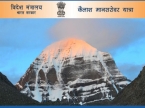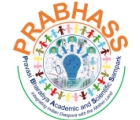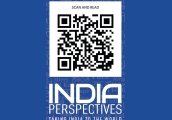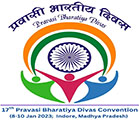- Home
- PRAMIT
- About Us
-
Consular Services
- Visa Services
- Visa Guidelines for USA Passport Holders
- Advisory on Satellite Phone
- Emergency Entry Visa Guidelines
- E - Visa
- Types of regular visa
- Visa for Diplomatic/ official/ Laissez-Passers Passport Holders
- Tourist Visa
- Ayush Visa
- Business Visa
- Employment Visa
- Transit Visa
- Medical Visa
- Student Visa (Study/Research /Internship)
- Entry Visa
- Conference Visa
- Mountaineering Visa
- Missionary Visa
- Journalist Visa(Journalist /Documentary filming)
- Film Visa: Visa for shooting Feature Films
- Visa for Pakistani Passport Holders/ Foreign Passport holders of Pakistani Origin
- Important Advisory on Fake Indian eVisa websites
- FAQ’s on Visa
- Travel Advisory for Indian Nationals
- Passport Services
- OCI Services
- Miscellaneous Consular Services
- Renunciation of Indian Citizenship
- Emergency Travel Document
- Global Entry Program (GEP) For Indian Nationals
- Emergency Contact No
- Open House
- Consular Camps
- Customs Regulations
- PAN Card for NRI/PIO ?
- Aadhaar Card for NRI/OCI/PIOs
- Adoption of Indian Children

- Vaccination Guideline
- About PRAMIT
- Important Notification for Travelers to India - Bringing on Import or Use of satellite phones in India
- Data of Death Record
- Visa Services
-
Community Affairs
- Officer-in -charge
- Assistance for distressed Indian women
- How to address issues related to Marriages of Indian nationals to Overseas Indians

- Marriages to Overseas Indians – a guidance booklet

- FAQs : Legal and other provisions in foreign countries on Indian women cheated/abandoned/abused by Overseas Indian Spouses

- Adult Protective Services (APS)
- Empanelled NGOs with Consulate
- Child Protective Services (CPS)
- Assistance for distressed women in India
- List of NGO's and Advocates in India

- List of State Women Commissions in India

- How to address issues related to Marriages of Indian nationals to Overseas Indians
- Community Organization providing emergency assistance
- Community Affairs Past Events
- Registration of Organization
- Madad

- Celebration of Pravasi Bharatiya Divas (PBD)
- Procedure protocols for transportation of Mortal Remains to India
- Temples/Gurudwaras in jurisdiction of CGI, NY
- Bill on NRI Marriages

- Procedure for sending/ forwarding Court Order/ Summons
-
Commerce & Eco
- Commercial Representative
- Economic Diplomacy Division

- List of American Companies involved in trade complaints by Indian Companies
- Invest in India
- US Business Newsletter
- India Business Newsletter
- Public Sector Undertakings and Indian Banks
- Doing Business with USA
- Manufacturers and Exporters in India
- India: Leather Exports
- www.fieo.org

- www.indiamart.com

- www.indianyellowpages.com

- www.tradeindia.com

- www.exportersindia.com

- DISCLAIMER: Links given to other Internet sites should not be construed as an endorsement / promotion of external websites by the Consulate General of India, New York. This Consulate does not take responsibility for the content therein. It does not endorse, approve, or certify such information, nor does it guarantee the accuracy, completeness, efficiency, timeliness, or correct sequencing of such information. They are given solely for access to prima facie information.
- Investing in India
- Information for NRIs
- India's Foreign Trade Policy

- India's Customs Import Tariff

- Taxation

- Exhibitions and Trade Fairs in India
- Useful Links
- Resource Materials
- iPIN
-
Culture
- Arts & Culture
- Indian Council of Cultural Relations (ICCR)

- Past Events
- Upcoming Events
- Classes@Consulate
- Archive (Photo Slider)
- Museums under Jurisdiction of CGI,NY

- Indian Restaurants under Jurisdiction of CGI,NY

- Gandhi@150
- 550th Birth anniversary of Guru Nanak Devji
- Indian Constitution Day
- International Day of Yoga
- अमरीका में हिंदी
-
Education
- Introduction
- Advisory for Indian Students in USA

- India Centric Activities
- Internship with us

- Registration of Indian Students in USA
- Fulbright Scholarships
- Certificates
- Students Handbook for Studying Abroad

- Related Links
- India Corner
- Study in India
- Education Photo Gallery
- RIT- OASIS organised Dandiya event with Mr. Jeffrey Cox, Director, International Student Services and Ms. Erica Ford, International Student Advisor
- Meet and Greet for Indian Students in USA, 21 October 2022 Consulate General of India in New York in association with GOPIO- Manhattan organized the 'Annual Day for Indian Students in USA' on October 21, 2022 at the Consulate. The Chief Guest for the evening was Mrs. Chandrika Tandon, Chairperson of Tandon Capital Associates and a recognized business leader, Grammy- nominated artist and humanitarian.
- Celebrating 20 years of Indian School of Business as part of Amrit Mahotsav. CGI, New York hosted ISB delegation led by Dean, its founding chairman & members and alumni on November 18, 2022
- Academic Research Collaborations
- Advisories
- Fulbright - Nehru and Fulbright - Kalam Fellowships
- हिंदी क्रियाकलाप
- Emergency Contact
- Media
- StartUps
- Home
-
PRAMIT
Pravasi Mitra (Helpline) - About Us
-
Consular Services
- Visa Services
- Visa Guidelines for USA Passport Holders
- Advisory on Satellite Phone
- Emergency Entry Visa Guidelines
- E - Visa
- Types of regular visa
- Visa for Diplomatic/ official/ Laissez-Passers Passport Holders
- Tourist Visa
- Ayush Visa
- Business Visa
- Employment Visa
- Transit Visa
- Medical Visa
- Student Visa (Study/Research /Internship)
- Entry Visa
- Conference Visa
- Mountaineering Visa
- Missionary Visa
- Journalist Visa(Journalist /Documentary filming)
- Film Visa: Visa for shooting Feature Films
- Visa for Pakistani Passport Holders/ Foreign Passport holders of Pakistani Origin
- Important Advisory on Fake Indian eVisa websites
- FAQ’s on Visa
- Travel Advisory for Indian Nationals
- Passport Services
- OCI Services
- Miscellaneous Consular Services
- Renunciation of Indian Citizenship
- Emergency Travel Document
- Global Entry Program (GEP) For Indian Nationals
- Emergency Contact No
- Open House
- Consular Camps
- Customs Regulations
- PAN Card for NRI/PIO ?
- Aadhaar Card for NRI/OCI/PIOs
- Adoption of Indian Children

- Vaccination Guideline
- About PRAMIT
- Important Notification for Travelers to India - Bringing on Import or Use of satellite phones in India
- Data of Death Record
- Visa Services
-
Community Affairs
- Officer-in -charge
- Assistance for distressed Indian women
- How to address issues related to Marriages of Indian nationals to Overseas Indians

- Marriages to Overseas Indians – a guidance booklet

- FAQs : Legal and other provisions in foreign countries on Indian women cheated/abandoned/abused by Overseas Indian Spouses

- Adult Protective Services (APS)
- Empanelled NGOs with Consulate
- Child Protective Services (CPS)
- Assistance for distressed women in India
- List of NGO's and Advocates in India

- List of State Women Commissions in India

- How to address issues related to Marriages of Indian nationals to Overseas Indians
- Community Organization providing emergency assistance
- Community Affairs Past Events
- Registration of Organization
- Madad

- Celebration of Pravasi Bharatiya Divas (PBD)
- Procedure protocols for transportation of Mortal Remains to India
- Temples/Gurudwaras in jurisdiction of CGI, NY
- Bill on NRI Marriages

- Procedure for sending/ forwarding Court Order/ Summons
-
Commerce & Eco
- Commercial Representative
- Economic Diplomacy Division

- List of American Companies involved in trade complaints by Indian Companies
- Invest in India
- US Business Newsletter
- India Business Newsletter
- Public Sector Undertakings and Indian Banks
- Doing Business with USA
- Manufacturers and Exporters in India
- India: Leather Exports
- www.fieo.org

- www.indiamart.com

- www.indianyellowpages.com

- www.tradeindia.com

- www.exportersindia.com

- DISCLAIMER: Links given to other Internet sites should not be construed as an endorsement / promotion of external websites by the Consulate General of India, New York. This Consulate does not take responsibility for the content therein. It does not endorse, approve, or certify such information, nor does it guarantee the accuracy, completeness, efficiency, timeliness, or correct sequencing of such information. They are given solely for access to prima facie information.
- Investing in India
- Information for NRIs
- India's Foreign Trade Policy

- India's Customs Import Tariff

- Taxation

- Exhibitions and Trade Fairs in India
- Useful Links
- Resource Materials
- iPIN
-
Culture
- Arts & Culture
- Indian Council of Cultural Relations (ICCR)

- Past Events
- Upcoming Events
- Classes@Consulate
- Archive (Photo Slider)
- Museums under Jurisdiction of CGI,NY

- Indian Restaurants under Jurisdiction of CGI,NY

- Gandhi@150
- 550th Birth anniversary of Guru Nanak Devji
- Indian Constitution Day
- International Day of Yoga
- अमरीका में हिंदी
-
Education
- Introduction
- Advisory for Indian Students in USA

- India Centric Activities
- Internship with us

- Registration of Indian Students in USA
- Fulbright Scholarships
- Certificates
- Students Handbook for Studying Abroad

- Related Links
- India Corner
- Study in India
- Education Photo Gallery
- RIT- OASIS organised Dandiya event with Mr. Jeffrey Cox, Director, International Student Services and Ms. Erica Ford, International Student Advisor
- Meet and Greet for Indian Students in USA, 21 October 2022 Consulate General of India in New York in association with GOPIO- Manhattan organized the 'Annual Day for Indian Students in USA' on October 21, 2022 at the Consulate. The Chief Guest for the evening was Mrs. Chandrika Tandon, Chairperson of Tandon Capital Associates and a recognized business leader, Grammy- nominated artist and humanitarian.
- Celebrating 20 years of Indian School of Business as part of Amrit Mahotsav. CGI, New York hosted ISB delegation led by Dean, its founding chairman & members and alumni on November 18, 2022
- Academic Research Collaborations
- Advisories
- Fulbright - Nehru and Fulbright - Kalam Fellowships
- हिंदी क्रियाकलाप
- Emergency Contact
- Media
- StartUps



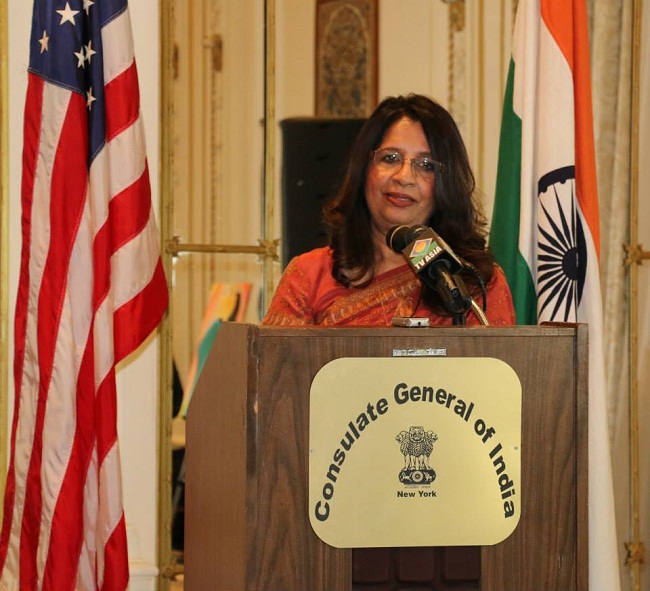
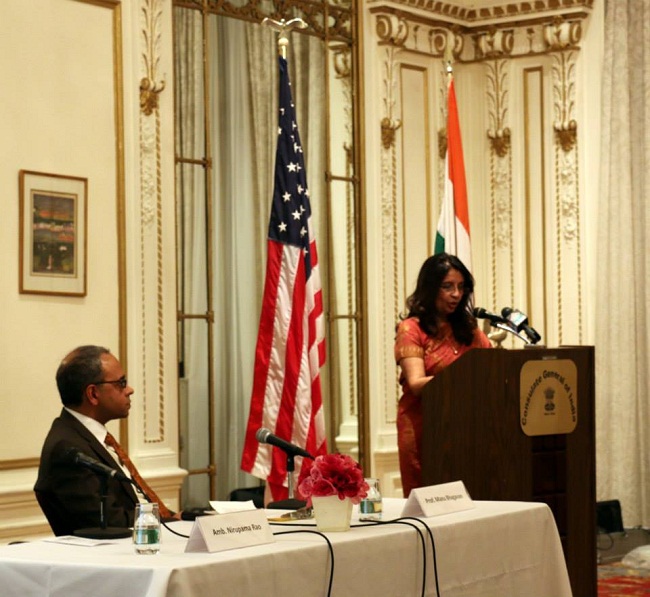
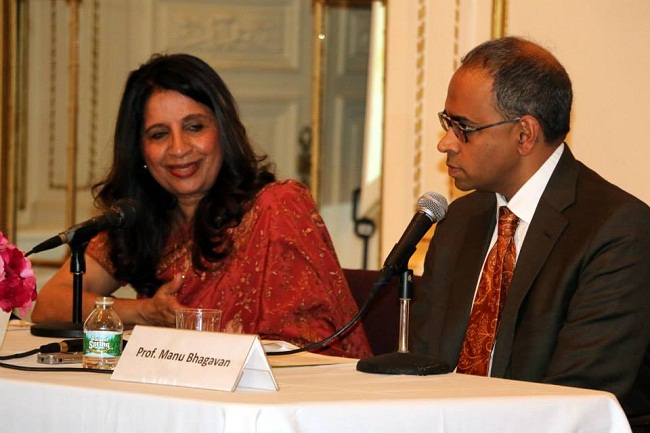
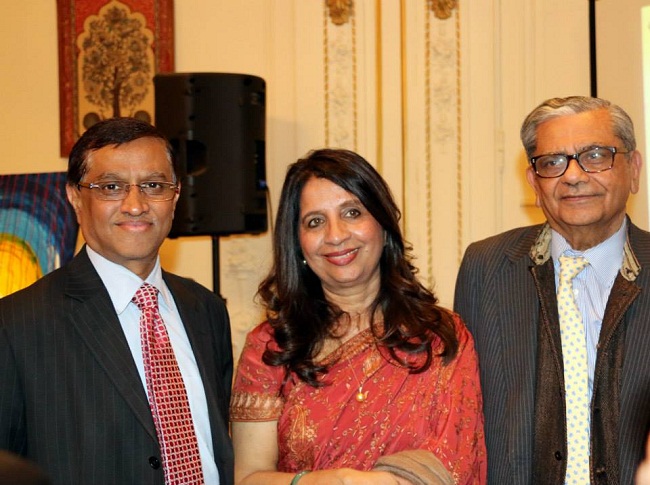
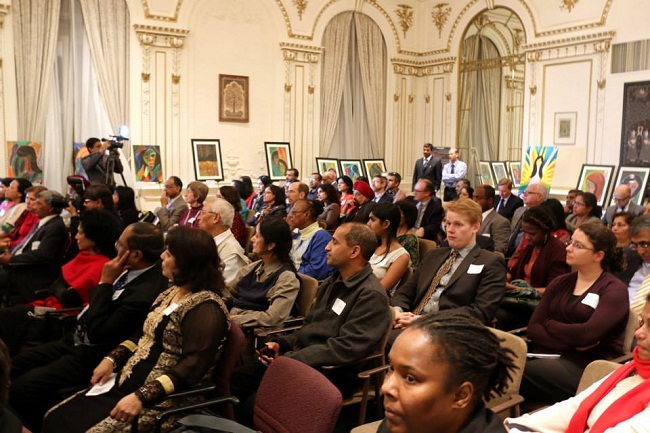

.jpg)






